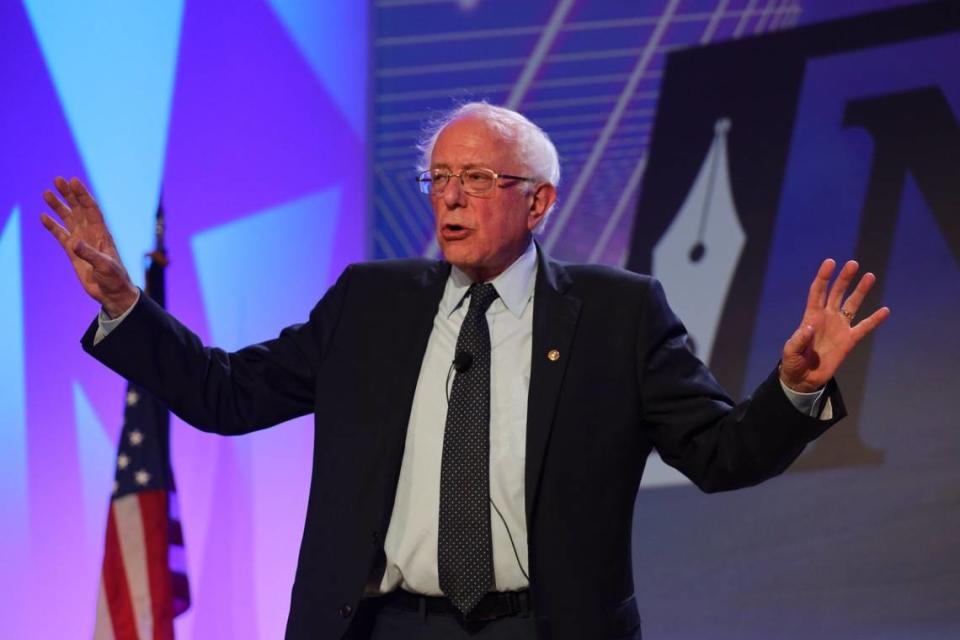Former political captive says Sanders questioned Cuba criticisms during prison meet
Alan Gross lost 110 pounds and several teeth while imprisoned for five years in Cuba. But during a visit in prison by Sen. Bernie Sanders in 2014, Gross says the Vermont senator told him that he did not understand why the island was so harshly criticized.
“I don’t know what’s so wrong about this country,” Sanders said during a one-hour meeting with the prisoner and two other members of Congress visiting Havana, Gross told the Miami Herald.
“I thought it was a pretty insensitive thing for him to say,” Gross said. “Couldn’t he see, with his own eyes, what was going on around the country that he’s been traveling through? And I was a hostage to the government of the country that he didn’t see anything wrong with.”
Gross said he didn’t reply to the senator. Although there were no guards present, Gross suspects Cuban authorities were recording the conversation.
“I was kind of shocked,” Gross said.
Sanders’ campaign did not respond Wednesday to Gross’ comments, published first by NPR Wednesday less than two weeks before the March 17 Florida Democratic primary.
Sanders, who is running for the Democratic nomination for the 2020 presidential election, has been criticized for praising aspects of the Soviet Union and the governments of Fidel Castro in Cuba and Daniel Ortega in Nicaragua. Recently, during an interview on CBS’ “60 Minutes,” Sanders again praised a literacy program carried out by Castro during the early years of the revolution, though he explicitly condemned Castro’s authoritarianism.
Gross said he tried to downplay his encounter with Sanders during a podcast with Politico in 2016. But he said he decided to speak out after “Sanders had that interview with CBS.”
“If he had some opinions about anything good that happened in Cuba since the revolution, then he should have framed it a little bit differently,” Gross said. “And the way he framed it shows the same lack of perspective and lack of sense that a presidential candidate shouldn’t show.”
Sanders’ comment on Cuba in 2014 came almost at the end of an hour of an “engaging conversation,” said Gross. Sanders was part of a congressional delegation that visited Cuba in February 2014. He met with Gross along with Sens. Heidi Heitkamp and Jon Tester.
Sanders was not “really involved” in most of the talk, Gross said.

Gross does not remember the details of the discussion other than that the subject of U.S. policy towards Cuba came up. Being imprisoned with little food available, he said what he remembered the most was that Heitkamp and Tester brought him two bags of cookies and a “giant” package of M&Ms with peanuts.
“I appreciated the visit,” Gross said. “Each one of them wanted to see me free. I had no contact with any of them before that time or after.”
Sarah Feldman, a spokeswoman for Sen. Tester of Montana, said the senator does not remember the exchange described by Gross. Former Sen. Heitkamp of North Dakota did not immediately respond to a request for comment.
In statements after his visit to Cuba, Sanders described the conversation with Gross as “interesting.”
Gross said he has made donations to several congressional and presidential campaigns, including Joe Biden’s, but said he is not linked to any of them. Gross divides his time now between Washington and Tel Aviv.
NPR first reported Gross’ anecdote about Sanders after Gross published a comment on Facebook.
At the time he was imprisoned in Cuba, Gross was working as a subcontractor for the U.S. Agency for International Development in a project to expand internet access for the Jewish community on the island. He was not the only one sneaking in internet technology banned by the Cuban authorities. Radio and TV Martí, two US government stations broadcasting to Cuba, also introduced satellite communication equipment into the country.
But Gross, a U.S. citizen, was the only one arrested in 2009 and charged with espionage. He was sentenced to 15 years. He was finally released on Dec. 17, 2014, in a prisoner exchange in which the Barack Obama government returned three Cuban spies to the island.
Gross’ story drew a sharp rebuke from Florida members of Congress, some of whom condemned Sanders’ remarks about Cuba’s literacy program last month. “You know what my reaction was?” Miami Democratic Rep. Donna Shalala said. “There he goes again,” .
Follow Nora Gámez Torres on Twitter: @ngameztorres

